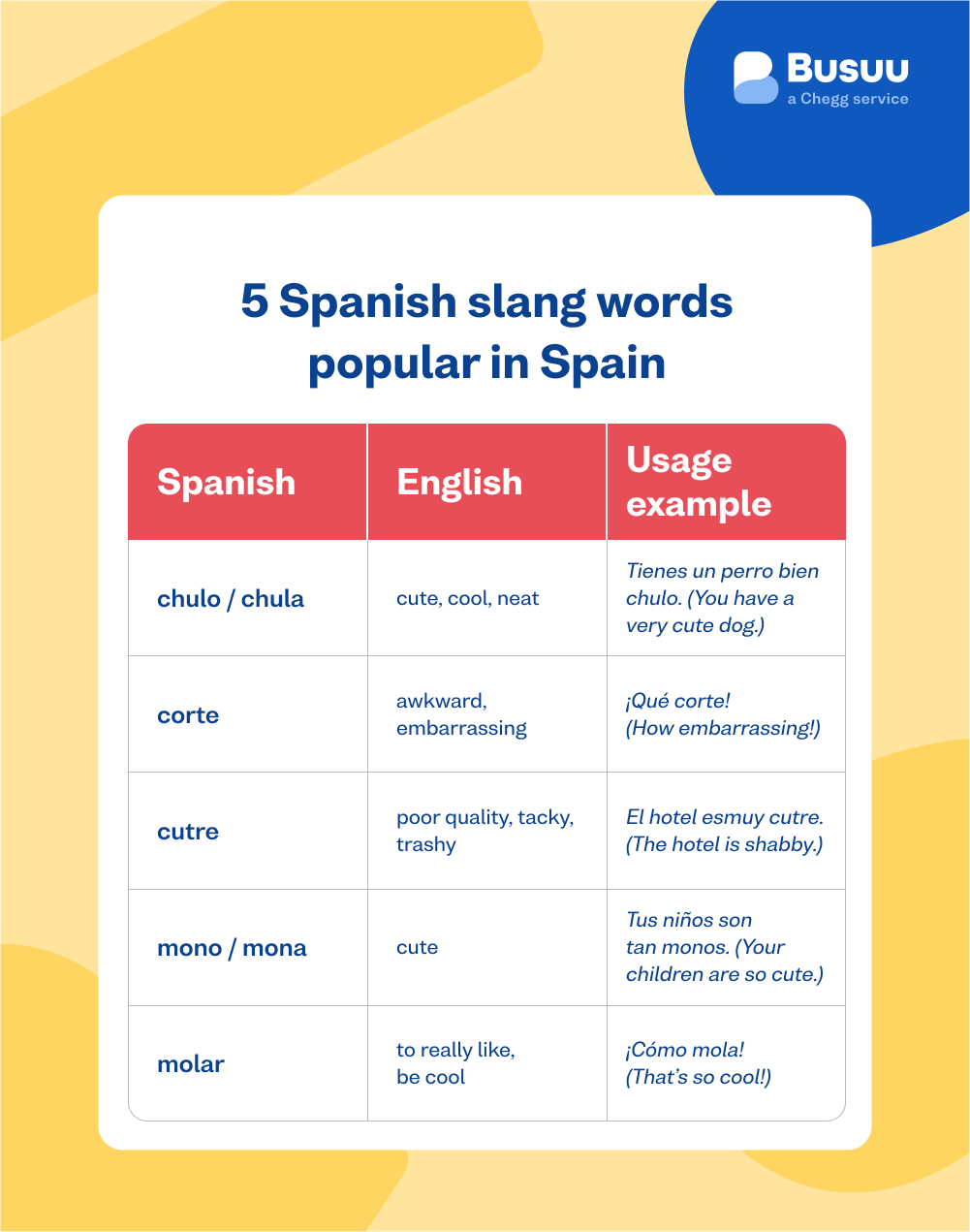Unlocking The Secrets Of Working In Spanish Slang: A Comprehensive Guide
Exploring the vibrant world of Spanish slang opens up a treasure trove of cultural nuances and everyday expressions that go beyond the textbook Spanish you may have learned in school. For those working or traveling in Spanish-speaking countries, understanding and using local slang can be the key to unlocking deeper connections with native speakers. Whether you're navigating office environments, social gatherings, or casual conversations, knowing the right slang can make all the difference. In this article, we'll delve into the intricacies of working in Spanish slang, offering practical tips, examples, and insights to help you communicate more effectively and authentically.
Spanish slang varies significantly across regions, making it a fascinating yet complex aspect of the language. While some phrases may be universally understood, others are specific to certain countries or even cities. This diversity means that learning slang is not just about expanding your vocabulary but also about appreciating the cultural richness of the Spanish-speaking world. As you immerse yourself in this linguistic adventure, you'll discover how slang can transform your interactions, making them more dynamic and engaging.
Before diving into the specifics, it's essential to approach slang with an open mind and a willingness to learn. Misusing or overusing slang can sometimes lead to misunderstandings or unintended offense. Therefore, it's crucial to understand the context in which certain phrases are used. By the end of this article, you'll have a solid foundation in working in Spanish slang, empowering you to navigate various situations with confidence and cultural sensitivity.
Read also:Merrimac House Of Pizza Menu A Complete Guide To Their Tastiest Offerings
What is the Importance of Learning Spanish Slang?
Learning Spanish slang is more than just acquiring new words; it's about understanding the cultural context in which these expressions are used. Slang often reflects the values, humor, and social dynamics of a community, providing a window into the local way of life. For instance, in a professional setting, knowing the right slang can help you build rapport with colleagues and clients. It shows that you're not just speaking the language but truly engaging with the culture.
Why Does Slang Differ Across Spanish-Speaking Countries?
The diversity of Spanish slang is a direct result of the rich cultural tapestry that spans across 20 countries. Each region has its own history, traditions, and influences that shape its linguistic landscape. For example, the slang used in Mexico may differ greatly from that in Argentina or Spain. This regional variation means that what works in one country might not resonate in another. Understanding these differences is key to effective communication and cultural sensitivity.
How Can You Identify Appropriate Slang for Your Workplace?
When working in Spanish slang, it's important to consider the formality of your environment. In a corporate setting, you might want to steer clear of overly casual or vulgar expressions. Instead, focus on phrases that convey professionalism while still maintaining a friendly tone. Observing how your colleagues use slang can provide valuable insights into what's appropriate. Additionally, asking native speakers for guidance can help you avoid potential pitfalls.
Tips for Incorporating Slang into Your Conversations
Here are some practical tips for effectively using slang in your daily interactions:
- Start with common, widely understood phrases.
- Practice in low-stakes situations to build confidence.
- Pay attention to non-verbal cues and adjust accordingly.
- Be open to feedback and willing to learn from mistakes.
Is Slang Necessary for Professional Communication?
While formal language is often prioritized in professional settings, incorporating slang can add a personal touch to your communication style. It demonstrates that you're adaptable and culturally aware, which are valuable traits in today's globalized workforce. However, it's important to strike a balance between professionalism and informality. Too much slang can undermine your credibility, while too little can make you seem distant or out of touch.
What Are Some Common Examples of Working in Spanish Slang?
Let's explore a few examples of slang that might come in handy in a work environment:
Read also:Chewy Snacks The Ultimate Guide To Enjoying Healthy And Delicious Treats
- "Echar una mano" – Literally meaning "to throw a hand," this phrase is used to offer assistance or support.
- "Hacerse el loco" – Translating to "pretending to be crazy," this expression is often used humorously to describe someone avoiding responsibility.
- "Ir pa'lante" – Meaning "to move forward," this phrase is commonly used to convey progress or ambition.
Can You Use Slang in Written Communication?
Using slang in written communication depends on the context and audience. In informal emails or messages, incorporating slang can make your writing more relatable and engaging. However, in formal documents or reports, it's best to stick to standard language. Always consider the purpose of your communication and tailor your language accordingly. If you're unsure, err on the side of caution and consult with a native speaker or colleague.
Exploring the Cultural Nuances of Working in Spanish Slang
Slang is deeply intertwined with cultural identity, making it a powerful tool for connecting with others. By embracing working in Spanish slang, you're not only enhancing your language skills but also showing respect for the culture. This cultural exchange can lead to stronger relationships and more meaningful interactions. Whether you're negotiating a business deal or collaborating on a project, understanding slang can give you a competitive edge.
Where Can You Learn Authentic Spanish Slang?
There are numerous resources available for learning authentic Spanish slang, from language apps to YouTube channels and podcasts. Immersing yourself in media produced by native speakers, such as movies, TV shows, and music, can also be highly effective. Engaging with local communities through social events or language exchange programs provides real-world practice and invaluable insights. Remember, the key to mastering slang is consistent exposure and active participation.
How Does Slang Evolve Over Time?
Language is a living entity, constantly evolving to reflect changing social norms and technological advancements. Slang is particularly susceptible to these changes, with new expressions emerging and old ones fading into obscurity. Staying up-to-date with the latest trends requires a keen awareness of cultural shifts and a willingness to adapt. By embracing this dynamic nature, you can ensure that your slang usage remains relevant and effective.
What Are Some Common Pitfalls to Avoid When Using Slang?
While slang can enhance your communication skills, it's important to be mindful of potential pitfalls:
- Overusing slang can make you appear immature or unprofessional.
- Misusing slang can lead to misunderstandings or offend others.
- Assuming universal understanding of slang can alienate certain audiences.
Avoiding these pitfalls involves a combination of cultural awareness, linguistic competence, and good judgment.
Conclusion: Embracing the Art of Working in Spanish Slang
In conclusion, working in Spanish slang offers a unique opportunity to deepen your connection with Spanish-speaking cultures. By learning and using slang appropriately, you can enhance your communication skills, build stronger relationships, and gain a competitive edge in both personal and professional settings. Remember, the key to success lies in understanding the context, respecting cultural nuances, and continuously expanding your knowledge. So, embrace the challenge, and let the world of Spanish slang enrich your linguistic journey.
Table of Contents
- Unlocking the Secrets of Working in Spanish Slang: A Comprehensive Guide
- What is the Importance of Learning Spanish Slang?
- Why Does Slang Differ Across Spanish-Speaking Countries?
- How Can You Identify Appropriate Slang for Your Workplace?
- Tips for Incorporating Slang into Your Conversations
- Is Slang Necessary for Professional Communication?
- What Are Some Common Examples of Working in Spanish Slang?
- Can You Use Slang in Written Communication?
- Exploring the Cultural Nuances of Working in Spanish Slang
- Where Can You Learn Authentic Spanish Slang?
- How Does Slang Evolve Over Time?
- What Are Some Common Pitfalls to Avoid When Using Slang?
- Conclusion: Embracing the Art of Working in Spanish Slang
Article Recommendations

